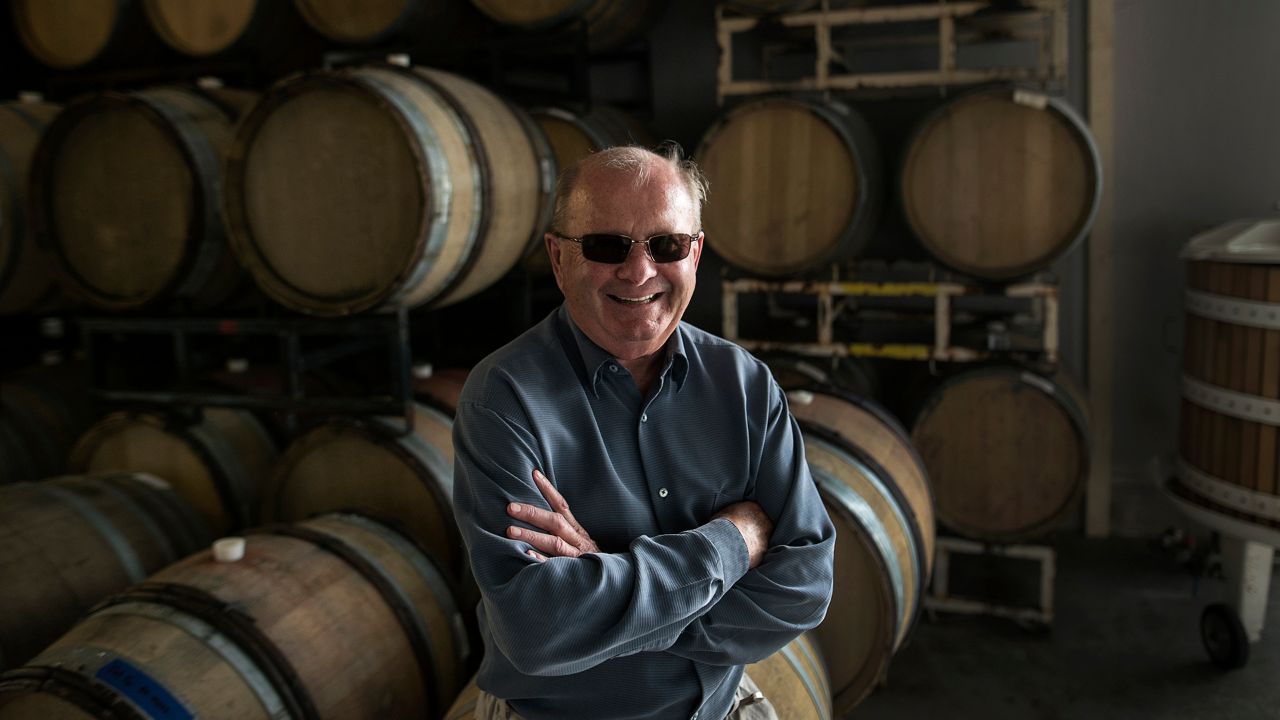Nova Scotia Sparkles

Story by Karen Pinchin; photos by Darren Calabrese
Karen was born in Toronto and lives in Canada's Maritime Provinces. Darren is an award-winning photographer based in the Maritime Provinces.
This Northern Canadian province is an unlikely source for world-class sparkling wine.
In 2012, a spectacular fall lightning storm descended upon Nova Scotia’s Benjamin Bridge winery. The vineyard, purchased by mining executive Gerry McConnell and his wife Dara Gordon, was hosting the wedding of their daughter Devon McConnell-Gordon.
“It was one of the worst storms I’ve ever seen come through the Gaspereau Valley,” McConnell-Gordon says. Bolts of lightning crackled across a purple sky, illuminating the grapes still waiting to be harvested. This young Nova Scotian — now the winery’s general manager — and her twin sister are just two of this region’s new, savvy entrepreneurs. They’re turning this province into a beverage juggernaut, particularly in the effervescent world of sparkling wine.
While Nova Scotia’s northern coast might not be famous for wine yet, it’s getting there. According to Peter Gamble, one of Canada’s top wine consultants, it’s only within the past few decades that winemakers and grape growers have taken this terroir seriously, assessing its qualities and matching the long growing season to particular wine styles. “The Nova Scotia terroir is so distinctive,” says Gamble, who was hired by Benjamin Bridge early on and helped develop its sparkling program.
Wolfville, where many of the wineries are located, is an easy drive from Halifax, Nova Scotia’s capital and largest city. Once I arrive in town, however, my designated driver is Jim Petrie, the fedora-wearing driver of the Wolfville Magic Winery Bus. In the summer and early fall, this red, British-style bus loops through four of the region’s vineyards, providing tourists a safe way to explore the wines from 10 a.m. to 5 p.m., Thursday through Sunday.
And the Magic Bus isn't the only option for responsible drinkers; there are several other privately operated tours in town that can be hired to visit any of the region's vineyards. Two other companies, Go North Tours and Grape Escapes, offer custom "design your own" half and full-day wine tours.
For hungry explorers, Luckett Vineyards has a gorgeous, sunny patio overlooking its vines. The bistro serves a wide assortment of soups, paninis and entrees. I enjoyed a delicious salad between tastings. Wash your lunch down with a glass of Buried Red wine, which is stored eight feet underground for 28 months in French and American oak barrels, or their signature Phone Box White.
We pull into, L’Acadie Vineyards. This morning owner Bruce Ewert and his three children are bottling the vineyard’s rosé. Alexa Ewart, 20, is the only Ewert child legally allowed to pour alcohol; she serves a tasting flight of L’Acadie’s award-winning sparkling wines.
“We scoped out the soil before we bought this property,” Alexa says. Her family moved here when she was 7 years old, drawn by the soil minerality and the long growing season. Her father had been making wine in British Columbia for over a decade, but her mother was born in Nova Scotia, and the family wanted a change. The region’s wine industry has since exploded with more than 20 wineries. “Even now, some people are really surprised we can make really good wine in Nova Scotia,” she says with a laugh.
Ewert, who is currently studying theatre in Vancouver and helps her parents over the summer, says most visitors still don’t understand how much work goes into making a traditional-method sparkling wine. That process involves resting wine on a sloped riddling rack — invented by France’s Madame Clicquot in the early 19th century — that allows dead yeast from the fermentation process to settle into necks of bottles. Then, those necks are frozen and disgorged, the frozen puck of yeast popping off before the bottle is sealed again. “Now I really understand why sparkling wine is so delicious and so expensive,” she says. “But it’s actually a good price for what it is. It’s all perspective.”
Before taking the head winemaking job in 2009 at Blomidon Estate Winery, Halifax-born Simon Rafuse worked in vineyards in France and New Zealand. He holds a master’s degree in viticulture and oenology from France’s Montpellier SupAgro university and was drawn here by the opportunity to make incredible wines in a semi-undiscovered area. “Within a few years, we’ve gone from a mom-and-pop cottage wine industry to participating in wine shows all over the world,” Rafuse says, adding some days they struggle to keep up with demand. “We’re sought-after for restaurant lists, and there’s a genuine buzz. It really has exploded.”
At Benjamin Bridge, head winemaker Jean-Benoit Deslauriers says much of the character of Wolfville-area wines is due to the “miraculous” air circulation caused by the nearby Bay of Fundy’s rising and falling tides — the greatest tidal shifts in the world. These shifts also ensure moderate vineyard temperatures. “The grapes ripen, and the sugar content increases, but the acidity is going to remain pretty much unspoiled,” he says. The result is a nearly unparalleled blend of freshness and richness. “The wines have energy, concentration, structure,” he says. “That’s a match made in heaven for traditional method sparkling wine.”
Nearly 20 years ago, when Gamble first assessed Benjamin Bridge’s Champagne-like terroir, he recommended the family plant classic French grapes — pinot noir, chardonnay and pinot meunier — with the eventual goal of building a world-class sparkling house. And at the peak of McConnell-Gordon’s wedding-night storm, Deslauriers’ favourite word to describe their wines was no longer a metaphor. “Electric,” he says.
Lunenburg’s Architecture and Maritime History Draw Visitors
Tall sailing ships, good food and historical walks are among the highlights of a visit to this charming Nova Scotia town.
The Phenomenal Bay of Fundy
New Brunswick’s coastal communities live with the pulse of the ocean, which provides an unforgettable experience.
Delightful St. Andrews offers simple pleasures
New Brunswick’s resort town is a great getaway for a family vacation or romantic weekend.








